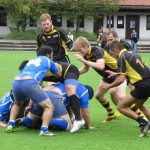Arndt’s Analysis – The Inside Story: St. Pauli Crack the Funkel Code
After four back-to-back victories, TSV 1860 München lost 2-0 in the Monday night game in the 2. Bundesliga. As in the past they again missed out on the chance to earn a big win and suffered a set-back in their fight for promotion. Carsten Arndt reviews why this loss shows 1860′s weaknesses in a relentless way and what they mean for the rest of the season.
Sechzig (1860) and FC St. Pauli are two teams that have been in peak form over the last few weeks, so it was clear that Monday night’s game was going to be a hard game for manager Friedhelm Funkel and his side.
What the fans ended up seeing during the 90 minutes was a complete disappointment, especially in the second half. It seems almost as if Sechzig don’t want to leave the 2. Bundesliga.
Fighting spirit wasn’t the problem but once again they had a lot of problems in attack. “We weren’t able to create any real chances in the whole game,” said centre back Christopher Schindler afterwards.
The visitors made use of 1860′s tactics. They kept it tight and tried to counterattack as fast as possible. As a result, the home side were robbed of their greatest strength and had a lot of problems running around after the opposition.
The midfield struggled in particular, including shooting-star Dominik Stahl who scored in all four games leading up to this one. When they were put under pressure they made many mistakes and misplaced too many passes, most notably from Kai Bülow which led to a gift of a goal for Christopher Nöthe just before the half-time break.
“We knew how 1860 would play. We had a plan and we put it into action. We blocked and attacked their defensive midfielder again and again,” the goal-scorer said after the match.
All spectators expected an improvement in the second half but instead, 1860′s biggest problem became evident. Munich are quite simply far too harmless in attack. If they fall behind, they have a lot of problems coming back into the game. Their style of play is too one-dimensional. There are no alternatives.
Daniel Adlung and Moritz Stoppelkamp occasionally found space on the wing, but their crosses were too imprecise and failed to find a teammate. “We put in 20 crosses, but they didn’t find anyone who could take the chance,” Schindler said to MunichNow.
Benny Lauth is such a person, but Lauth wasn’t in the game. He played listlessly and it seems as though he has lost the fun in playing the game. He’s now gone fifteen matches without a goal, which is more than 1,200 minutes. Add to that the fact that he seemed to be afflicted with a lot of defensive work and it’s easy to understand why the current Lauth isn’t the figure we are used to.
So with 16 goals in 18 matches, 1860 still have the worst attack in the league. The last time they scored as few goals as this year was in the 1991/92 season when they were relegated to the third division.
Things won’t be that bad this season, but 1860 must win the bigger games. To do that, they must improve their attack, otherwise they will miss out on promotion again.






 Euro Converter
Euro Converter